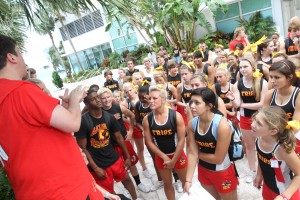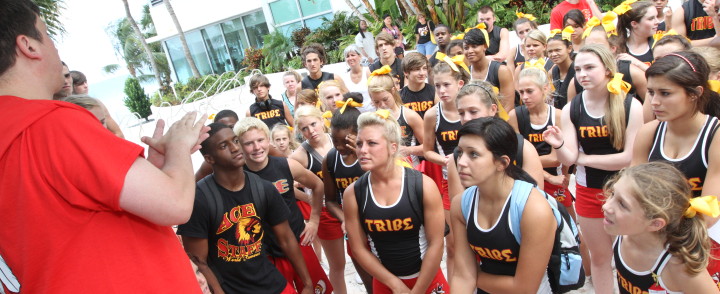More Than Business
 At Mystic All Stars in Apple Valley, CA, signs on the wall proudly proclaim “Family,” and its teams chant “We are Family” at practices and competitions. The close-knit atmosphere at Mystic signifies what is true for so many all-star programs—that gyms can be much more than just places to practice tumbling, twisting and rehearsing for the next big event, but rather places where seeds of meaningful relationships are sown. Strong emotional connections often form between coaches and athletes, thanks to the intense training and shared cheer experiences that bind them together. But are such deep bonds good for business—or risky business?
At Mystic All Stars in Apple Valley, CA, signs on the wall proudly proclaim “Family,” and its teams chant “We are Family” at practices and competitions. The close-knit atmosphere at Mystic signifies what is true for so many all-star programs—that gyms can be much more than just places to practice tumbling, twisting and rehearsing for the next big event, but rather places where seeds of meaningful relationships are sown. Strong emotional connections often form between coaches and athletes, thanks to the intense training and shared cheer experiences that bind them together. But are such deep bonds good for business—or risky business?
On the positive end of the spectrum, coaching provides a great opportunity to influence kids positively and instill beneficial traits and habits in them. Mystic All Stars owner Robert Alvey says he and his staff go to great lengths to form special bonds with their athletes. “I have had the pleasure of influencing students of all ages and socio- economic backgrounds,” shares Alvey. “Some of my students come from broken homes and this is the only family they know.”
Coaches can also help students deal with unforeseeable tragedies in their lives. At Cheer Extreme’s Raleigh location, owner Kelly Alison Smith saw this firsthand when an athlete’s mother was recently diagnosed with leukemia. The mother was in desperate need of bone marrow donations, and finding a match was a tall task.
“[The athlete] was devastated and so were we,” says Smith. “Together we devised a plan to set up as many bone marrow drives as possible. We spread the word about how easy it is to donate bone marrow and received hundreds of cheek swap sets.” Within two months, Tonia’s mother got a call that a match had been found. Adds Smith, “The relationship formed between this family and me will be everlasting.”
Seeing the athletes bloom into responsible, productive adults is another heartening byproduct for coaches and gym owners. Very recently, ACE Cheer Company owner Happy Hooper attended the wedding of one of his all-star athletes. “I simply thought, ‘How amazing that I have had the honor to watch her grow into an amazing young person, cheer in college and watch her enter the workforce as a contributing member of a marketing firm,” he says. “Now I’ve seen her achieve yet another outstanding life rite—to marry the person she loves.”
Setting Boundaries
Though relationships shared with athletes are undoubtedly fulfilling, they can also be personally challenging—especially when cheer professionals get too attached. Alvey recalls one male athlete to whom he acted as a “surrogate father,” granting a full cheer scholarship and even allowing him and his mother to reside in his guest home temporarily. When the athlete unexpectedly transferred to another gym, Alvey was devastated. “I have only one flaw and that is I care too much,” says Alvey. “That can sometimes let you down.”
He adds that it’s helpful if you can keep things in perspective and accept that you will be disappointed once in a while: “No matter how hard you try there may be that one kid in a hundred that you just can’t help, and as painful as that might be, you just have to let them go.”
For Alvey, sometimes “letting go” also means recognizing that what’s best for the athlete isn’t always what’s best for the gym. When Brandon Shinnamon, an at-rish athlete whom Alvey had personally recruited and mentored, showed exceptional cheer potential, Alvey decided to refer him to Pacific Coast Magic. There Shinnamon could cheer on its Worlds team “Mysterious,” whereas the highest level offered at Mystic All-Stars was Level 3. “I didn’t want him to miss the opportunities that would be afforded to him [as a Level 5 athlete],” says Alvey.
However, even when you have a tight bond with a particular athlete, it’s crucial to avoid favoring any one person or placing individual needs over the team as a whole. “As a coach or gym owner, you must find that line to make sure you never develop favorites,” warns Hooper. Smith even goes as far as to sometimes overcompensate—she admits that she is usually harder on those she is closer to during practice. “So, from a public eye, it seems the opposite,” she explains.
The bottom line is to not overstep the line. “It’s okay to build relationships, but always make sure you set boundaries and establish them and don’t stray from them. This will help the students to understand when you may have to be stern or help to correct a negative action,” says Alvey.
If gyms have policies stressing that each athlete should get individual feedback and attention, it can help deter coaches from getting too involved with a favorite few. At Cheer Extreme Raleigh, the coaches are tasked with keeping detailed notes on each athlete and how he or she is progressing throughout the season. “We send out individual progress reports to each and every kid in my gym, so they feel the personal touch from the coaching staff,” says Smith.
Ultimately, cheer professionals need to accept the fact that they won’t be able to resolve all of the problems in their athletes’ lives—and that the parents should always be informed about serious issues. “If a situation begins to approach the inappropriate line, you as a coach should seek the parents’ help. If your attempts to reach parents or family members fail, then encourage the athlete to reach out to a professional counselor,” advises Hooper.








